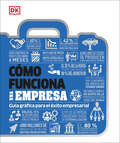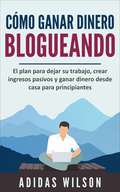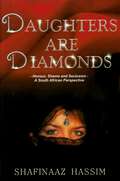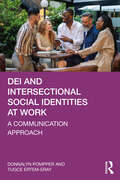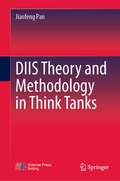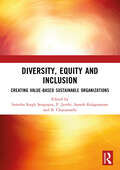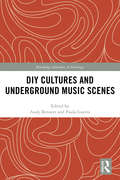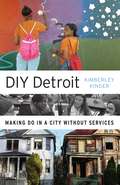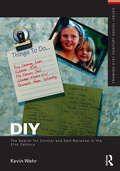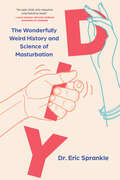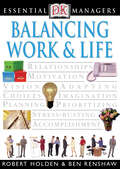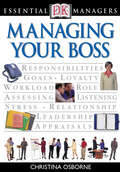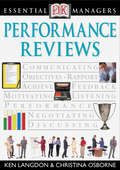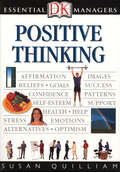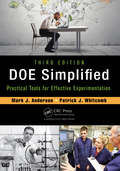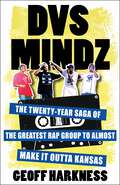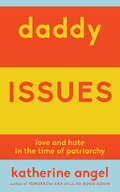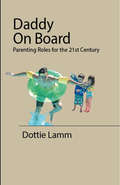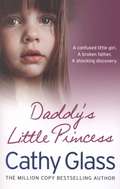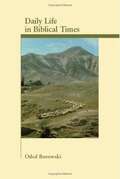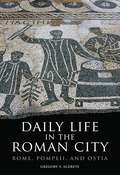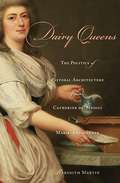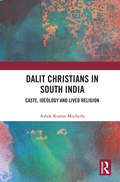- Table View
- List View
Cómo funciona una empresa: Guía gráfica para el éxito empresarial (DK How Stuff Works)
by Alexandra BlackUn máster empresarial en una práctica guía ilustrada¿Por qué el flujo de efectivo es tan importante? ¿En qué consiste la producción ágil? ¿Cómo funciona el marketing digital? ¿Quién forma parte del consejo ejecutivo?Cómo funciona una empresa explica los conceptos clave de la empresa mediante atractivos gráficos y un lenguaje sencillo y alejado de tecnicismos. Constituye una excelente introducción para estudiantes de estudios empresariales, personas que desee conocer las bases de los negocios sin hacer un MBA y empresarios que deseen tener éxito en el mercado global del siglo XXI.SOBRE LOS AUTORESEl Dr. Julian Sims se incorporó al mundo académico tras una exitosa carrera empresarial en Estados Unidos y el Reino Unido. Es profesor de Dirección de Empresas en Birkbeck, Universidad de Londres, censor jurado de cuentas y profesional colegiado de tecnologías de la información. Ha publicado un gran número de artículos en revistas académicas.Philippa Anderson es escritora de temas empresariales y consultora de comunicación, y ha trabajado como asesora de distintas multinacionales, entre las que están 3M, Anglo American y Coca-Cola.Alexandra Black estudió comunicación empresarial y ha sido periodista del diario financiero del grupo Nikkei Inc. en Japón. En su etapa en Tokio fue editora de la división de análisis de riesgos del banco de inversión JP Morgan.Joe Stanley-Smith es periodista de la International Tax Review en Londres, donde está especializado en impuestos indirectos y litigios fiscales. Se graduó en periodismo, en la especialidad de información empresarial, por la Universidad de Kingston, Reino Unido.
Cómo ganar dinero blogueando: El plan para dejar su trabajo, crear ingresos pasivos y ganar dinero desde casa para principiantes
by Adidas WilsonLos blogs comenzaron como revistas en línea donde las personas compartían sus vidas. Pero hoy, los objetivos son más profesionales. La mayoría de las personas ahora bloguea para promocionar su negocio o marca. Esta publicación destaca razones comunes para los blogs y los beneficios. A las personas les encanta compartir lo que les apasiona. Si te encanta pescar, querrás contarle al mundo entero al respecto. Esto se aplica a otras cosas como marketing, fotografía, etc. Bloguear sobre lo que amas te ayuda a conectarte con otras personas que comparten tu pasión, en todo el mundo. Un blog te brinda una plataforma para enseñar a otros. Al hacerlo, también aprenderá más sobre el tema. Educar a través de un blog puede abrir un flujo de ingresos para usted. Los blogs para dueños de negocios aumentan la exposición. El contenido regular del blog le permite visibilidad en los resultados de búsqueda de Google. Y si crea contenido para otros sitios web, expondrá su negocio a una nueva audiencia. Compartir lo que sabes a través de un blog hace que las personas te vean como una autoridad. Si elige un nicho específico, puede comenzar a ser invitado a hablar en eventos, podcasts y entrevistas.
DAUGHTERS ARE DIAMONDS
by Shafinaaz HassimDaughters are Diamonds is a ground breaking treatise on the objectification of women in honour-bound sectors of society. As a study, it sets out to define these questions: How are the opportunities, challenges and obstacles facing South African Indian Muslim women within the family, perceived and experienced by the individual? To what extent, if at all, does traditionalist culture create/influence a gap between opportunity and achievement for South African Indian Muslim women? The statement that "women are diamonds" is often used by Indian Muslim traditionalists to justify the abject seclusion of women. In this view, that which is valuable should be hidden in safekeeping. The metaphor of the diamond is used to illustrate the objectification of daughters borne of honour-bound societies, and the limits put to the administration of their lives, in keeping with the code of honour. This study is a comment on the notion that, in keeping with this honour code, there is a fine line between maintaining the dignity of a people and infringing on the rights of the individual. It also asks whether women are able to carve out a space for themselves within which a fully reflexive life may be lived in spite of the restrictions placed on them.
DEI and Intersectional Social Identities at Work: A Communication Approach
by Donnalyn Pompper Tugce Ertem-ErayThis book equips readers—both students and communication practitioners—with the theoretical understanding and practical skills they need to support nonprofit and for-profit organizations to create and assess their diversity, equity, inclusion (DEI), and social identity intersectionality goals.Through applied examples of the insider activist role that the communication function plays, the book helps future and current professional communicators navigate organizations toward authentic relationship-building with internal and external audiences. It teaches that embracing DEI includes acknowledging social identity intersectionalities—recognizing that people possess multiple social identity dimensions of age, culture, ethnicity/race, faith/spirituality, gender, physical/psychological ability, sexual orientation, social class, and more. In order to illuminate the theory discussed in the book, each chapter includes thought-provoking situation-opportunity sidebars, discussion questions for drilling deeper into the issues at hand, and case studies with applied lessons about DEI issues.This is an ideal text for advanced undergraduates and graduate courses in organizational communication, strategic communication, marketing communication, human resources, and public relations, as well as for communication practitioners working in these subdisciplines.
DIIS Theory and Methodology in Think Tanks
by Jiaofeng PanThis book provides the readers with the overall latest research on think tanks, summarizing the characteristics of think tanks, revealing the general laws and internal logic of think tank research, applying systems, dialectical views and operations research, system theory, and cybernetics to the problems existing in the research work of think tanks at home and abroad. Based on problem-oriented, evidence-oriented and scientific orientation, this book systematically considers the methodology of think tank research, proposes the DIIS theoretical method system of think tank research, defines the standardization process of think tank research and the quality standard of think tank DIIS, and gives corresponding DIIS to the actual think tank research problem. The method aims to improve the scientificity, effectiveness, and reliability of the research results of think tanks, provide systematic theoretical analysis for think tank research, promote the professional development of think tanks, and better serve the modernization of national governance systems and governance capabilities. This book presents new theoretical and research method support and reference that contribute to macro decision-making departments, management departments, scientific research institutes, universities, and enterprises think tank research related departments, strategic decision makers, think tank managers, think tank researchers, and readers interested in think tanks reading and using. Finally yet importantly, this book embodies the research of think tank as the object of investigation, jumping out of specific social conditions, using systemic thoughts, thinking about the more general role and characteristics of think tanks from the theoretical level, important theoretical issues such as principles and logic systems that think tank research should follow.
DIVERSITY, EQUITY AND INCLUSION: CREATING VALUE-BASED SUSTAINABLE ORGANIZATIONS
by Sunita Singh Sengupta Suresh Kalagnanam P. Jyothi B. CharumathiThe benefits of high integrity and high-responsibility organizations are well[1]established conscience mechanisms based on the principles of inclusion that emphasize justice, care, and fair practices at workplaces. Superrich Amazon investor Nick Hanauer writes in Oxfam’s state of wealth inequality report published on Monday (January 21, 2019) “I am a practitioner of capitalism,” … The most important lesson I have learned from these decades of experience with market capitalism is that morality and justice are the fundamental prerequisites for prosperity and economic growth (Singh Sengupta, 2021). When leaders and organizations operate from a deep awareness of their consciousness—they naturally behave responsibly beyond what appears to be their own self-interest…The managers who integrate spiritual values with their managerial styles in the entire operations management system bring integrity and oneness to the organizations…
DIY Cultures and Underground Music Scenes (Routledge Advances in Sociology)
by Andy Bennett Paula GuerraThis volume examines the global influence and impact of DIY cultural practice as this informs the production, performance and consumption of underground music in different parts of the world. The book brings together a series of original studies of DIY musical activities in Europe, North and South America, Asia and Oceania. The chapters combine insights from established academic writers with the work of younger scholars, some of whom are directly engaged in contemporary underground music scenes. The book begins by revisiting and re-evaluating key themes and issues that have been used in studying the cultural meaning of alternative and underground music scenes, notably aspects of space, place and identity and the political economy of DIY cultural practice. The book then explores how the DIY cultural practices that characterize alternative and underground music scenes have been impacted and influenced by technological change, notably the emergence of digital media. Finally, in acknowledging the over 40-year history of DIY cultural practice in punk and post-punk contexts, the book considers how DIY cultures have become embedded in cultural memory and the emotional geographies of place. Through combining high-quality data and fresh conceptual insights in the context of an international body of work spanning the disciplines of popular-music studies, cultural and media studies, and sociology the book offers a series of innovative new directions in the study of DIY cultures and underground/alternative music scenes. This volume will be of particular interest to undergraduate students in the above-mentioned fields of study, as well as an invaluable resource for established academics and researchers working in these and related fields.
DIY Detroit: Making Do in a City without Services
by Kimberley KinderFor ten years James Robertson walked the twenty-one-mile round-trip from his Detroit home to his factory job; when his story went viral, it brought him an outpouring of attention and support. But what of Robertson&’s Detroit neighbors, likewise stuck in a blighted city without services as basic as a bus line? What they&’re left with, after decades of disinvestment and decline, is DIY urbanism—sweeping their own streets, maintaining public parks, planting community gardens, boarding up empty buildings, even acting as real estate agents and landlords for abandoned homes.DIY Detroit describes a phenomenon that, in our times of austerity measures and market-based governance, has become woefully routine as inhabitants of deteriorating cities &“domesticate&” public services in order to get by. The voices that animate this book humanize Detroit&’s troubles—from a middle-class African American civic activist drawn back by a crisis of conscience; to a young Latina stay-at-home mom who has never left the city and whose husband works in construction; to a European woman with a mixed-race adopted family and a passion for social reform, who introduces a chicken coop, goat shed, and market garden into the neighborhood. These people show firsthand how living with disinvestment means getting organized to manage public works on a neighborhood scale, helping friends and family members solve logistical problems, and promoting creativity, compassion, and self-direction as an alternative to broken dreams and passive lifestyles.Kimberley Kinder reveals how the efforts of these Detroiters and others like them create new urban logics and transform the expectations residents have about their environments. At the same time she cautions against romanticizing such acts, which are, after all, short-term solutions to a deep and spreading social injustice that demands comprehensive change.
DIY: The Search For Control And Self-reliance In The 21st Century (Framing 21st Century Social Issues)
by Kevin WehrFrom the driveway mechanic to the backyard gardener, many diverse people are "doing it themselves" by building or repairing the stuff of their daily lives without the aid of experts. Do It Yourself uses Habermas’s colonization of the lifeworld as a frame and mobilizes Marx’s concepts of alienation and mystification to examine how social behaviors can be a conscious reply to a complex and fast-moving world, a nostalgia for simpler times past, or a just an economic impulse. Each main chapter is anchored by an extended empirical example: back-to-the-land, home-schooling, and self-government.
DIY: The Wonderfully Weird History and Science of Masturbation
by Eric SprankleThe first-ever social and scientific history of masturbation, which unapologetically critiques a system that has sought to control the very human desire for self-pleasure. Despite decades of medical and psychological research confirming that masturbation is healthy, the act remains shrouded in taboo and pseudoscience. In DIY, Dr. Eric Sprankle reveals the untold story of crusaders on a long campaign to suppress masturbation and the sex educators fighting back with science. He introduces readers to a colorful cast of characters: doctors advocating for the use of chastity devices, wellness influencers who believe ejaculation depletes the body of vital nutrients, pastors who preach that masturbation creates mermaids, and vibrator aficionados who teach the curious how to come. DIY will challenge what you think you know about the very human need for self-pleasure. Part sex-positive exposé, part fascinating science, DIY spotlights generations of sex education countering anti-masturbation pseudoscience with empowering truths about pleasure. This sex book is perfect for fans of Mary Roach books like Bonk or anyone curious about the history of sex and masturbation.
DK Essential Managers: Balancing Work and Life (DK Essential Managers)
by Robert Holden Ben RenshawThis practical guide will help you manage your career and your personal life to achieve both success and happiness. It balances detail and accessibility to make for a read that is concise as well as comprehensive.Written by Robert Holden, a psychologist and stress expert, and Ben Renshaw, a leadership coach and therapist. They are co-directors of The Happiness Project, and each have authored several books, including Holden's Be Happy and Crenshaw's Lead. Part of the DK Essential Managers series. Packed with essential tips for today's competitive business world, these efficient guidebooks are ideal for anyone interested in improving their business skills. Concise treatment of dozens of techniques, skills, and methods make Essential Managers the most accessible guide to business available.
DK Essential Managers: Managing Your Boss (DK Essential Managers)
by Christina OsborneEvery manager is stuck between their employees and their boss — but if you learn the right techniques, management works in both directions. You can be effective in your job if you learn to manage your boss. Know what you want in your career, and assess what you need from your own supervisor, so that you can work jointly to reach your goals. You will find that it is easier to advance your own goals when you develop a better, cooperative relationship, and your boss will find that their own productivity increases as well. The whole team will be better off. With clear, practical steps, Managing Your Boss manages to makes this difficult process accessible and achievable. The DK Essential Managers series covers a range of business and management topics and has sold more than two million copies worldwide. Each guide is clearly presented for ease of reference, with visual pointers, tips, and graphics.
DK Essential Managers: Performance Reviews (DK Essential Managers)
by Ken Langdon Christina OsborneLearn everything you need to know to evaluate and enhance staff performance. This helpful guide explains how to prepare and conduct an appraisal session and how to follow up with effective action plans. Practical techniques demonstrate how to motivate your staff, and power tips help you to handle real-life situations and develop the skills to build a committed team. The Essential Managers have sold more than 2 million copies worldwide! Experienced and novice managers alike can benefit from these compact guides. The topics are relevant to every work environment, from large corporations to small businesses. Concise treatments of dozens of business techniques, skills, methods, and problems are presented with hundreds of photos, charts, and diagrams. It is the most exciting and accessible approach to business and self-improvement available.
DK Essential Managers: Positive Thinking (DK Essential Managers)
by Susan QuilliamPositive thinking can help you realize your goals, but for most people, it&’s a skill that has be learned and practiced regularly. This book uses expert tips, clear text, and hard-working illustrations to show you how to assess your thinking patterns and change your negative perceptions in order to live a confident, fulfilled life.From helping you identify areas that have negativity in your life, to guiding you through rethinking negative beliefs, to learning new mental and emotional strategies, this book will help you transform your approach to living. Self-assessment exercises enable you to evaluate your positivity. The guide then helps you apply these fundamental lessons to your life — in the workplace, in your love life, for health, at play, and in friendship. A solid foundation of positivity will help you get the best from life.The DK Essential Managers series covers a range of business and management topics and has sold more than two million copies worldwide. Each guide is clearly presented for ease of reference, with visual pointers, tips, and graphics.
DOCTOR TO DOCTOR: Success Strategies Elevating Your Business & Personal Life
by Emily LetranThis book is a compilation of strategies for success covering multiple disciplines, such as medicine, dentistry, optometry, chiropractic, philosophy and pharmacy. We believe in the unity of health care professional to unite, share stories and help each other accelerate personal and business growth. Contributors: Kianor Shah, DMD, MBA Emily Letran, DDS, MS, CHPC Edward J. Zuckerberg, DDS, FAGD Kayvon Javid, DDS, DICOI, CPI Aura Imbarus PhD Susan Truong, MD Alan Chong, DC Gerald Morris, MD, MPH John Kriak, PharmD and The Dream Team of the Global Summits Institute
DOE Simplified: Practical Tools for Effective Experimentation, Third Edition
by Mark J. Anderson Patrick J. WhitcombOffering a planned approach for determining cause and effect, DOE Simplified: Practical Tools for Effective Experimentation, Third Edition integrates the authors decades of combined experience in providing training, consulting, and computational tools to industrial experimenters. Supplying readers with the statistical means to analyze how numerous variables interact, it is ideal for those seeking breakthroughs in product quality and process efficiency via systematic experimentation.Following in the footsteps of its bestselling predecessors, this edition incorporates a lively approach to learning the fundamentals of the design of experiments (DOE). It lightens up the inherently dry complexities with interesting sidebars and amusing anecdotes.The book explains simple methods for collecting and displaying data and presents comparative experiments for testing hypotheses. Discussing how to block the sources of variation from your analysis, it looks at two-level factorial designs and covers analysis of variance. It also details a four-step planning process for designing and executing experiments that takes statistical power into consideration.This edition includes a major revision of the software that accompanies the book (via download) and sets the stage for introducing experiment designs where the randomization of one or more hard-to-change factors can be restricted. Along these lines, it includes a new chapter on split plots and adds coverage of a number of recent developments in the design and analysis of experiments.Readers have access to case studies, problems, practice experiments, a glossary of terms, and a glossary of statistical symbols, as well as a series of dynamic online lectures that cover the first several chapters of the book.
DVS Mindz: The Twenty-Year Saga of the Greatest Rap Group to Almost Make It Outta Kansas
by Geoff Harkness99.9% of aspiring rappers never make it in the music industry. So why do we only hear the stories of the ones who do?DVS Mindz might be the greatest rap group you’ve never heard of. Formed in Topeka, Kansas, in the mid-1990s, they developed a reputation for ferocious rhyming and frenetic live performances. In their heyday, DVS Mindz released a critically acclaimed CD, received nominations for prestigious awards, and opened for legends such as Wu-Tang Clan, Run-DMC, and De La Soul as well as KC icon Tech N9ne. But the group struggled with creative differences, substance abuse, ego battles, and money issues, and they split up in 2003.Geoff Harkness takes readers on a unique two-decade journey alongside the members of DVS Mindz, chronicling their childhoods, their brush with success, and what became of them in the years that followed. Based on more than one hundred hours of video and audio recordings from 1999 to 2022, this fly-on-the-wall account offers a backstage pass into the recording studios and radio stations, video shoots and house parties, nightclubs and concert halls of the Kansas City-Lawrence-Topeka music scene circa 2000.DVS Mindz is at once a compulsively readable group biography of four talented MCs, a vibrant voyage through the forgotten history of local hip hop, and a breathtakingly real story of struggling to achieve big dreams.
Daddy Issues: Love and Hate in the Time of Patriarchy
by Katherine AngelOn the fraught bonds between daughters and their fathers, women and the patriarchywomen patriarchy In this beguiling, incisive book, critically acclaimed writer Katherine Angel examines the place of fathers in contemporary culture with her characteristic mix of boldness and nuance, asking how the mixture of love and hatred we feel toward our fathers—and patriarchal father figures—can be turned into a relationship that is generative rather than destructive. Moving deftly between psychoanalysis from Freud to Winnicott, cultural visions of fathering from King Lear to Ivanka Trump, and issues from incest to MeToo, Angel probes the fraught bond of daughters and fathers, women and the patriarchal regime. What, she asks, is this discomfiting space of love and hate—and how are we to reckon with both fealty and rebellion? As in her earlier book Tomorrow Sex Will Be Good Again, Angel proves herself to be one of the most perceptive feminist writers at work today.
Daddy's Little Princess
by Cathy GlassLittle Beth, aged 7, had been brought up by her father after her mother left when she was a toddler. But when he's suddenly admitted to hospital with psychiatric problems Beth is taken into care. Beth is a sweet-natured child who appears to have been well looked after. But it isn't long before Cathy begins to have concerns that the relationship between Beth and her father is not as it should be. They clearly love each other very much and Derek spoils his daughter, treating her like a princess, but there is something bothering Cathy, something she can't quite put her finger on. But, despite Cathy flagging her concerns to the social worker Jessie, no action is taken. Until Jessie accompanies Beth to the hospital to see her father. . . Then, suddenly, everything changes. All contact is stopped and Cathy is left to help pick up the pieces as poor Beth struggles to understand what her daddy has done wrong.
Dads, Kids, and Fitness: A Father's Guide to Family Health
by William MarsiglioNow more than ever, American dads act as hands-on caregivers who are devoted to keeping themselves and their families healthy. Yet, men are also disproportionately likely to neglect their own health care, diets, and exercise routines--bad habits that they risk passing on to their children. In Dads, Kids, and Fitness, William Marsiglio challenges dads to become more health-conscious in how they live and raise their children. His conclusions are drawn not only from his revealing interviews with a diverse sample of dads and pediatric healthcare professionals, but also from his own unique personal experiences--as a teenage father who, thirty-one years later, became a later-life dad to a second son. Marsiglio's research highlights the value of treating dads as central players in what he calls the social health matrix, which can serve both healthy children and those with special needs. He also outlines how schools, healthcare facilities, religious groups, and other organizations can help dads make a positive imprint on their families' health, fitness, and well-being. Anchored in compelling life stories of joy, tragedy, and resilience, Dads, Kids, and Fitness extends and deepens public conversation about health at a pivotal historical moment. Its progressive message breathes new life into discussions about fathering, manhood, and health.
Daily Life in Biblical Times
by Oded BorowskiWhile the history of Israel during the period from ca. 1200 to 586 B. C. E. has been in the forefront of biblical research, little attention has been given to questions of daily life. Where did the Israelites live? What did people do for a living? What did they eat and what affected their health? How did the family function? These and similar questions form the basis for this book. The book introduces different aspects of daily life. It describes the natural setting and the people who occupied the land. It deals with the economy, both rural and urban, emphasizing the main sources of livelihood such as agriculture, herding, and trade. These topics are discussed in relation to the family in particular and the social structure in general. Other topics include urban society, the bureaucracy and the military. Beyond material culture, the book delves into daily and seasonal cultural, social and religious activities, art, music, and the place of writing in Israelite society. Drawing on textual and archaeological evidence, and written with nontechnical language, the book will be especially helpful for undergraduates, seminarians, pastors, rabbis, and other interested nonspecialist readers as well as graduate students and faculty in Hebrew Bible.
Daily Life in the Roman City: Rome, Pompeii, and Ostia
by Gregory AldreteAlthough most Romans lived outside urban centers, the core of Roman civilization lay in its cities. Throughout the empire these cities--modeled as they were after Rome--were strikingly alike. In Gregory Aldrete's exhaustive account, readers can peer into the inner workings of daily life in ancient Rome and examine the history, infrastructure, government, and economy of Rome; its emperors; and its inhabitants--their life and death, dangers and pleasures, entertainment, and religion. Aldrete also shows how Roman cities differed. To accomplish this comparison, in addition to Rome, he explores Ostia, an industrial port town, and Pompeii, the doomed playground of the rich. Daily Life in the Roman City includes a chronology, maps, numerous illustrations, useful appendices (on names, the Roman calendar, clothing and appearance, and construction techniques), a bibliography, and an index. This volume is ideal for high school and college students and for others wishing to examine the realities of life in ancient Rome.
Dairy Queens: The Politics of Pastoral Architecture from Catherine de' Medici to Marie-Antoinette
by Meredith MartinThese garden structures―most famously the faux-rustic, white marble dairy built for Marie-Antoinette’s Hameau at Versailles―have long been dismissed as the trifling follies of a reckless elite. Martin challenges such assumptions and reveals the pivotal role that pleasure dairies played in cultural and political life, especially with respect to polarizing debates about nobility, femininity, and domesticity. Together with other forms of pastoral architecture such as model farms and hermitages, pleasure dairies were crucial arenas for elite women to exercise and experiment with identity and power.
Dalit Christians in South India: Caste, Ideology and Lived Religion
by Ashok Kumar MocherlaThis ethnographic study of Dalit Lutherans in South India examines how the lived religion of Dalit Christians contests the structures of caste domination in rural Andhra. It shows how the emergence of Dalit Christianity generated new religious ideas, patterns, terrains, rituals, and practices that challenge the traditional notions of caste privilege and impact the politics of the region. It highlights the transforming role of Dalit agency in the development of Christianity, which is largely unexplored in the studies of Christian missions and anthropology of Christianity in India. The book looks at the social history of Christianity, critical events of protest, platforms of community politics, caste ideology, and local politics and interlocking of caste with congregation to provide a constructive critique of the dominant paradigm of the Dalit movement, which often treats Dalits as a homogenous social group. It discusses the pragmatic changes within the politics of Dalit Christianity as viewed from the margins of Indian society and incorporated through engagement with political ideologies (from communism to the Ambedkarite movement) and religious belief systems (from Hinduism to Christianity). This volume at the intersection of religion and caste will be an essential read for students and researchers of Dalit studies, political studies, sociology, sociology of religion, religious studies, social justice and exclusion studies, and South Asian studies.
